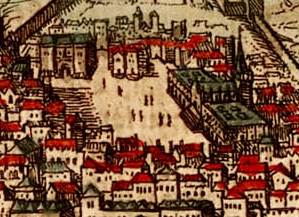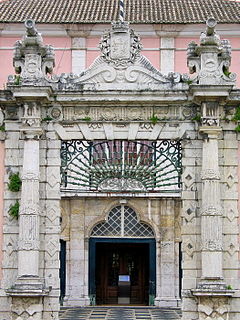
The Instituto Nacional de Estatística (INE) is the National Statistical Institute of Portugal. Its headquarters is located in Lisbon. It also calls itself Statistics Portugal in English. The first census in Portugal was carried out in 1864. The census takes place every 10 years and as of March 2011 a new census is being conducted.

Benfica is a freguesia and district of Lisbon, the capital of Portugal. Located in northern Lisbon, Benfica is west of São Domingos de Benfica, Carnide, and Campolide, north of Belém, Ajuda, and Alcântara, and directly east of Lisbon's border with Amadora. The population in 2011 was 36,985,

Domingos António de Sequeira was a famous Portuguese painter at the Royal Court of King John VI of Portugal.

Francisco Vieira, who choose the artistic name of Vieira Portuense, was a Portuguese painter, one of the introducers of Neoclassicism in Portuguese painting. He was, in the neoclassical style, one of the two great Portuguese painters of his generation, with Domingos Sequeira.

The Museu Nacional de Arte Antiga, also known in English as the National Museum of Ancient Art, is the Portuguese national art museum, located in Lisbon. The MNAA has one of the largest art collections in the world, with over 40,000 items spanning a vast collection of painting, sculpture, goldware, furniture, textiles, ceramics, and prints. It is one of the most visited museums in Portugal.

Alvalade is a freguesia and district of Lisbon, the capital of Portugal. Located in central Lisbon, Alvalade is south of Lumiar and Olivais, west of Marvila, east of São Domingos de Benfica, and north of Avenidas Novas and Areeiro. The population in 2011 was 31,813.

The Estaus Palace in Rossio Square, in Lisbon, was the headquarters of the Portuguese Inquisition. The original palace was built on the north side of the square around 1450 as lodging for foreign dignitaries and noblemen visiting Lisbon.
Anjos is a former parish (freguesia) in the municipality of Lisbon, Portugal. At the administrative reorganization of Lisbon on 8 December 2012 it became part of the parish Arroios. It was created in 1564. It has a total area of 0.48 km2 and total population of 9,738 inhabitants (2001); density: 20,372.4 inhabitants/km2.

Pena is a former parish (freguesia) in the municipality of Lisbon, Portugal. At the administrative reorganization of Lisbon on 8 December 2012 it became part of the parish Arroios. In 2001, the population of the district included 6038 residents, in an area of 0.5 km², representing a highly compact population.

The Palace of the Marquesses of Fronteira is a Portuguese palace located in Lisbon, Portugal.

Igreja de São Domingos is a church in Lisbon, Portugal. It is classified as a National Monument.

Galveias Palace is a Portuguese palace located in Lisbon, Portugal, in Avenidas Novas freguesia.

The Museu da Música is a museum in Lisbon, Portugal. The museum primarily features musical instruments; among its holdings is a 1725 Stradivarius cello once owned and played by King Luís I of Portugal (ruled 1861–1889.

Santa Maria Maior is a freguesia and district of Lisbon, the capital of Portugal. Located in the historic center of Lisbon, Santa Maria Maior is to the west of São Vicente, east of Misericórdia, and south of Arroios and Santo António. It is home to numerous historic monuments, including Lisbon Cathedral, the Rossio, and the Praça do Comércio, as well as famous neighborhoods, such as the Lisbon Baixa, as well as parts of Bairro Alto and Alfama. The population in 2011 was 12,822,

Areeiro is a freguesia and district of Lisbon, the capital of Portugal. Located in central Lisbon, Areeiro is east of Avenidas Novas, east of Marvila, south of Alvalade, and north of Beato, Penha de França, and Arroios. The population in 2011 was 20,131,

Arroios is a freguesia and district of Lisbon, the capital of Portugal. Located in central Lisbon, Arroios is north of Santa Maria Maior and São Vicente, east of Santo António, south of Avenidas Novas and Areeiro, and west of Penha de França. The population in 2011 was 31,653.

Santo António is a freguesia and district of Lisbon, the capital of Portugal. Located in central Lisbon, Santo António is east of Campo de Ourique, north of Santa Maria Maior and Misericórdia, west of Arroios, and south of Avenidas Novas. It is known for its luxury shopping, Michelin star restaurants, and as home to many of Lisbon's most recognizable landmarks and neighborhoods, such as Marquis of Pombal Square, Avenida da Liberdade, and Restauradores Square. The population in 2011 was 11,836.

São Vicente is a freguesia and district of Lisbon, the capital of Portugal. Located in the historic center of Lisbon, São Vicente is to the east of Santa Maria Maior, south of Arroios, and west of Penha de França. São Vicente is home to numerous historic neighborhoods, including Alfama. The population in 2011 was 15,339.

Lino António da Conceição was a Portuguese artist known for his Modernist frescoes. He made many friezes, frescos, stained glass and ceramic panels for public buildings in Portugal. He taught in several schools and was director for many years at the Escola Secundária Artística António Arroio in Lisbon, having an influence over hundreds of artists, mostly painters and designers.

Arroios is a temporarily closed station on the Green Line of the Lisbon Metro. The station is located in the Almirante Reis Avenue, in Arroios neighbourhood.



















